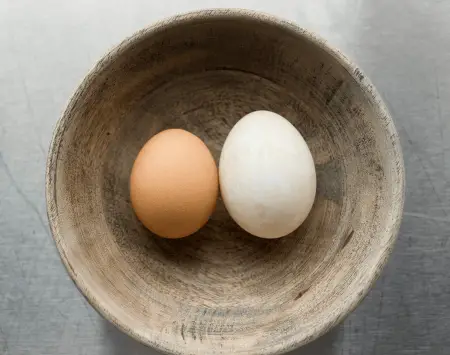Eggs are not only delicious, but also are good sources of vitamins and minerals when eaten in moderation.
While the most commonly eaten egg is from hens, a lesser-known type is just as palatable and beneficial: duck eggs. Are duck and chicken eggs the same? Do both provide the same nutritional value? This article will discuss the difference between the two.
Summary Table
| Duck Eggs | Chicken Eggs |
| Bigger eggs; may be gray, light green, white or brown | Smaller eggs; can be white, brown, or light green |
| Hard shells do not easily crack; longer shelf life | Fragile shells easily crack; shorter shelf life |
| Contain crystal clear albumen and darker colored yolk | Contain yellowish albumen and a yellow to dark orange yolk |
| Have higher amounts of cholesterol, protein, Omega-3s, and other vitamins and minerals | Contain cholesterol, protein, Omega-3s and other vitamins and minerals |
| Expensive and sometimes hard to find | Affordable, available in grocery stores |
| Laid by ducks every day for several years | Laid by chickens every day or every week, for just a couple years |
Descriptions

Duck eggs come from various duck breeds like Khaki Campbells, Welsh Harlequin and Cayuga ducks, among others. These eggs may vary in size but they are notably large.
The color of their shells can also vary depending on the duck breed, and may be gray, white, brown, or even light green. Inside, you can see a crystal clear egg white and a darker colored yolk. Also, duck eggs have hard shells, so they do not easily crack. This means they have a long shelf life.
Because of their size, duck eggs also have a higher concentration of nutrients inside, although they basically have the same profile as chicken eggs. Duck eggs have plenty of crystal clear albumen or egg white, which is why some bakers prefer them over chicken eggs. They also contain huge yolks, which mean more cholesterol, protein, fat, Omega-3s, B12, iron, and vitamin A. These eggs are not only packed with vitamins and minerals, but are also rich and creamy. Their distinct strong flavor can be an advantage or disadvantage depending on your personal taste.
Additionally, most duck breeds lay more than one egg every day for several years. Duck eggs are also expensive and are not usually sold in grocery stores.
Chicken eggs come from chicken breeds like Rhode Island Red, White Leghorns or Golden Comet, to name a few. Their very fragile shells may be light green, white, or brown. When cracked open, chicken eggs have yellow or orange yolks and albumen with a yellowish tint.
Moreover, chicken eggs contain cholesterol, protein, fat and other vitamins and minerals. They can be boiled or fried and are also used in baked goods, casseroles, and other recipes all over the world.
Some chicken breeds lay eggs daily, while others lay eggs once or twice a week. Chicken eggs are affordable and are readily available in grocery stores.
Duck vs Chicken Eggs
What, then, is the difference between duck and chicken eggs?
The most obvious difference between the two types of eggs is their appearance. Duck eggs are significantly bigger than chicken eggs. They are usually gray, white, brown or light green. Chicken eggs can also be white, brown, light green but are rarely gray. Duck eggs also have a harder shell and a longer shelf life, unlike chicken eggs which have fragile shells that easily crack. Additionally, duck eggs usually have a darker colored yolk and a clear egg white.
Chicken eggs have yellowish egg whites and their yolks may be pale yellow to dark orange depending on the diet of the chicken.
In terms of nutrient profile, both are similar, except that duck eggs have more cholesterol, protein, fat, and Omega-3s because of their size.
Duck eggs also have a stronger taste because of the duck’s diet.
When it comes to the price and availability, chicken eggs are widely sold and are affordable, while duck eggs are more expensive and are sometimes hard to find. Ducks can lay eggs every single day for several years, while chickens can lay eggs every day or once every week for two or three years only.





